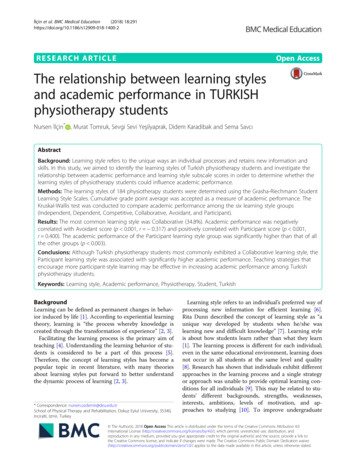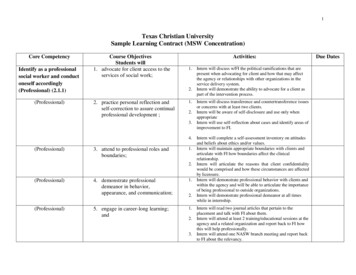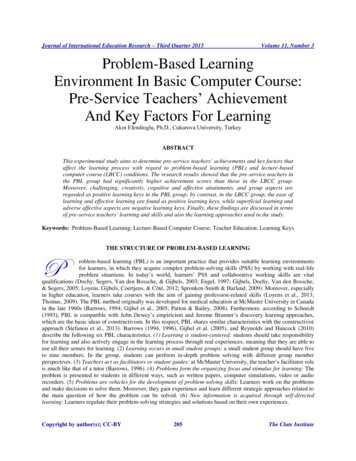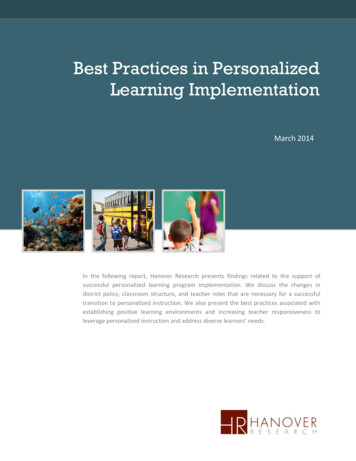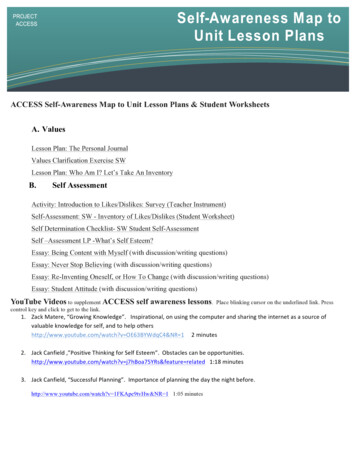
Transcription
RenewalWorks: What We Are LearningExecutive SummaryRenewalWorks is a vital ministry serving the Episcopal Church in a time whencommitment to spiritual growth needs to be renewed. The process invitescongregants to reflect on their own spiritual vitality and to examine the ways thatthe church supports them in their spiritual journey. We offer this work in theconfidence that the spiritual health and vitality of our church is inseparable fromthe spiritual health and vitality of its individual members. The information thatfollows illustrates what we are learning about our denomination. The news ischallenging. The need is urgent. We contend with complacency and lowexpectations. We are an older denomination, with membership numbers in decline.Spiritual practices and embrace of beliefs are low relative to other denominations.Leaders often feel depleted, even defeated. At the same time, there is hope, as we canidentify specific, quantifiable actions that can be taken, catalysts which can buildcultures of discipleship and help the Episcopal Church grow spiritually.Introduction to RenewalWorksRenewalWorks, a ministry of Forward Movement, offers a process to gain insightinto the spiritual health and the potential for spiritual growth in congregations. Thisprocess includes an assessment (an online inventory) and a set of workshops forcongregational leaders to understand the results of the inventory and to map out anaction plan in response. Members of the RenewalWorks staff provide coaching andsuggest resources, but people within the congregation lead the work. RenewalWorksis much more than just a program; it offers a much-needed diagnosis for achallenged denomination and follows up with the encouragement of provencatalysts that can make a difference in the life of a church.RenewalWorks began as a ministry of Forward Movement in July 2013 with thisvision: to build cultures of discipleship in Episcopal congregations by encouraging a1
singular focus on spiritual growth. RenewalWorks offers a clearly delineated andsupported process to refocus and rejuvenate parishes by increasing spiritual growth,helping congregants grow in love of God and love of neighbor.The RenewalWorks ProcessRenewalWorks begins with a commitment from clergy and lay leadership to explorethe spiritual status of the congregation. With that commitment, members of thecongregation are invited and encouraged to take a Spiritual Life Inventory (SLI).This survey of spiritual beliefs and practices provides conclusive, quantitativeanalysis of the Episcopal Church and its spiritual vitality, based on the collectiveresults from nearly 200 participating congregations and 12,000 parishioners. Theinsights gleaned from the inventory are significant, but that is not its only value.When a congregation takes the inventory, the reflections and conversations thatfollow are also valuable, providing impetus for clarifying and reinforcing corebeliefs and practices of the Anglican tradition.After the inventory, the process continues in a congregation, as a small, selectworkshop team meets for four sessions to answer four questions, one per session:1. Where have we been? This workshop explores the spiritual journey of thecongregation and also considers the spiritual journey of the individuals onthe workshop team.2. Where are we now? The results of the inventory provide insight into thecurrent state of the congregation.3. Where do we feel called to go, in light of the inventory results? Theworkshop team explores a few next steps for the congregation, weighingstrengths and growth opportunities, asking what God is calling this church towork on.4. How will we get there? A limited number of action steps to deepen thespiritual lives of our congregants are identified, with discussion of how theworkshop team will bring the rest of the congregation along.What We Are LearningIn three years, over 12,000 Episcopalians have taken the inventory, representingnearly 200 parishes. Fifty-one percent of churches were in the South, 26 percent inthe Midwest, and 18 percent in the Northeast. Forty-seven percent of the churches2
reported 101-250 parishioners. Respondents describe themselves as mainline ortraditional. They are older (75 percent over age 50), white (91 percent white nonHispanic), wealthy (60 percent report income of 75,000 or above) and longtenured in their churches (54 percent have attended for more than ten years).Responses to the inventory indicate a distinct Episcopal culture, often characterizedby a passive and complacent approach to life in the church. Many people attendSunday services but do not feel personally responsible for practicing faith outside ofthat weekly service. Other Episcopalians report interest in learning more about adeeper spiritual journey and in being challenged. But they are not sure how to takethe next steps. Still others report that the church could do a better job of supportingtheir individual spiritual journeys.The research behind RenewalWorks indicates a spiritual continuum, withrespondents falling into four groups on that continuum. Those four stages include: Exploring a life with God in ChristGrowing in a life with God in ChristDeepening in a life with God in ChristCentered in a life with God and Christ.We will look more closely at these areas in the following pages. (For more insightinto this continuum, a short book called Footsteps is available through ForwardMovement.) While the continuum is depicted here as a linear model, which hassome biblical precedent, one might also think of the continuum as four concentriccircles, with spiritual growth a process of moving closer to the center.3
Seventy-three percent of Episcopal respondents identified themselves in the firsttwo stages of spiritual growth; in other words, they consider themselves to be at anearly, perhaps less mature stage of spiritual development. According to theirdemographic information, these respondents are older in age and have attendedtheir church for longer than ten years, which raises the question: Why haven’t morepeople developed a deeper relationship with God in Christ?Data shows that a commitment to daily spiritual practices is a strong driver formovement from the second to the third stage of spiritual growth. Most respondentsreport that their church does not provide resources that teach, model or encouragethese kinds of spiritual practices. For instance, while the Episcopal Church stressesthe importance of prayer, many congregations fail to offer teaching on prayer aspart of church programming or Christian formation. Not surprisingly, respondentsindicate a lack of competence or confidence in leading group prayer or praying theDaily Office. In a period where spiritual practices such as guided yoga andmeditation have become prevalent in the culture, church programs that focus ontraining in prayer seem to have diminished.Data also indicates that Episcopal congregations embrace a strong serving culture.However, there is often a lack of clarity about why that service is an expression oroutgrowth of Christian identity, sometimes making it difficult to distinguish churchmission and outreach from the good work of other nonprofit organizations. Wehave also learned that the ability to evangelize and to tithe is limited untilparishioners have moved further along the spiritual continuum.Parishioners in the first two stages (exploring and growing) of the continuum arehighly dependent on the church—and specifically the clergy—to help teach, guideand mentor them. With 73 (should number be spelled out?) percent placingthemselves in the first two stages, the role of clergy in spiritual development issignificant. This can represent a challenge: Clergy report that the many demands oftheir jobs pull them away from teaching about personal spiritual practice as well asfrom being fed themselves in their own spiritual journey. We often hear clergyexpressing concern that they have lost touch with why they entered ministry: Theyhave lost touch with their first love. At the same time, clergy also indicate that theyare hesitant to issue a challenge to their parishioners, to elevate expectations amiddiminishing attendance and an overall decline in interest in religion.4
Parishioners, however, say they want leadership that encourages and teaches themto grow in their faith. Sixty percent want the church to help them develop arelationship with God in Christ. Fifty-seven percent want to be challenged to growand take next steps spiritually. When asked how their current church was doing inthose criteria, only 42 percent said they were extremely satisfied or very satisfiedwith the way their church helps them develop a relationship with Jesus Christ.Thirty-eight percent felt they were extremely or very satisfied with how the churchchallenged them to grow and take next steps. So we find that parishioners’ desire formore formation, their hunger for spiritual growth can exist in tension with theirtime constraints and the many demands on the clergy. Many people report that thegreatest obstacle to their own spiritual development comes from their busyschedules. Many clergy report that they are pulled in so many directions that theycannot focus as they would like on their own spiritual growth or the spiritualgrowth of members of their congregation.Where We Are SpirituallyLet’s take a closer look at the four stages of exploring, growing, deepening, andcentered.ExploringEighteen percent of parishioners identify in the first stage of spiritual growth(exploring), an interesting insight given the fact that many respondents alsoindicated that they have been in the church longer than ten years. People in this firststage are exploring the basic beliefs expressed in the Episcopal tradition. They aredrawn to the beauty, indeed the majesty of the liturgy, particularly Holy Eucharist.At the same time, they are eager for a deeper understanding of the sacraments andfor help from the church in that regard. They affirm belief in God, though they arenot sure what faith claims they would make about Christ. Generally speaking, faithis not a significant part of their life on a day-to-day basis.GrowingThe majority surveyed (55 percent) identify themselves in the second stage ofspiritual growth (growing). They are committed to the Christian faith but still havemany questions and have not developed a personal relationship with God in Christ.5
Again, people in stages 1-2 of the continuum are highly dependent on the churchand especially the clergy to help them grow in faith. In order for them to growspiritually, the development of a relationship with God in Christ is key. Often this isaccomplished by exploration of personal spiritual practices during the week, whenthey are not in church. These practices may include prayer, time in solitude, andreflection on scripture.DeepeningTwenty-three percent of parishioners identify themselves in the third stage ofspiritual growth (deepening their relationship with God in Christ). They describehaving a personal relationship with God. They are making a transition to increasingthe value of that personal relationship with God over their church membership.They feel close to Christ and depend on him daily for guidance. For this group,opportunities to have spiritual friendships, mentors or small group-connections areespecially important; these provide a place of accountability and support where theycan challenge and discuss their faith journey.CenteredFour percent of the respondents identify in the fourth stage of spiritual growth(centered). That does not mean that the spiritual journey is over, or that this groupdoes need any more growth. But for this small group, a personal relationship withGod in Christ is the most important relationship in their lives.Moving People from One Stage to AnotherKey catalysts for spiritual growthResearch indicates identifiable catalysts that can bring transformation and spiritualgrowth in the lives of parishioners. Four catalysts in particular seem to make adifference: Engagement with scripture: At every stage along the continuum,engagement with scripture is transformative. When Episcopal congregationsgo through the RenewalWorks process, one of the most common responses isto find a way to engage with scripture as a community. In the first stages ofour work, many churches chose to read The Story, published by Zondervan.6
More recently, Forward Movement has published The Path, which seemsparticularly useful for Episcopalians. The Bible Challenge is another resourcethat has helped in this engagement process. The transforming power of the eucharist: For Episcopalians, especially forthose beginning an intentional spiritual journey with God in Christ,participation in the eucharist is key. The more that churches can help peoplegrow in understanding this mysterious sacrament, the further people movealong the spiritual continuum. A deeper prayer life: Research indicates a lack of confidence and satisfactionwith prayer life. A discernible deepening of relationship with God happens inthe same way any relationship grows—through time spent in conversation.The more that we call people to an active prayer life, marked by the varietiesof prayer experience (confession, praise, intercession, thanksgiving,contemplation), the more they will grow. The heart of the leader: None of this transformation will be possible withoutthe commitment of the leader to his or her own discipleship, including clarityof belief, dedication to spiritual practice, and service in the world. Leaderscan’t give what they don’t have. RenewalWorks seeks to support leaders inthis journey and help them stay connected to the reasons they got intoministry in the first place, again, to their first love.ArchetypesThe research on which RenewalWorks is based started fifteen years ago in a largenon-denominational church in suburban Chicago. That work of exploring spiritualvitality in congregations represents input from more than 2,000 congregations andover half a million people. That research led to the identification of eight archetypesof congregations, learnings that are detailed in a book entitled Rise by CallyParkinson.In our research with Episcopal congregations, we find that all but a few EpiscopalChurches fall into one of three archetypes, described below: Troubled: Fifty-five percent of Episcopal congregations fit in an archetypedescribed as troubled. It may be helpful to think of them as restless or hungry(rather than conflicted or in crisis). Basically, these congregations are marked7
by a desire for greater spiritual growth; they have a hankering for more fromtheir church, and in particular, from their clergy. They are not satisfied withwhat they are receiving. There is great opportunity for clergy to work withfolks in these congregations. Extroverted: Twenty-three percent of Episcopal congregations fit in anarchetype described as extroverted. These congregations are deeplycommitted to service in the world, mission, and outreach. Indeed, amongdenominations surveyed, Episcopalians show a distinctive commitment tothis kind of service. But among Episcopalians, there is a limited correlationbetween the call to service and spiritual beliefs and practices, making thechurch not all that different from many nonprofit organizations. Complacent: Twenty-one percent of Episcopal congregations fit in anarchetype described as complacent. This is perhaps the most difficultarchetype to shift in terms of transformation. These congregations aremarked by low expectations of transformation and resistance to change andchallenge.Episcopal congregations represent strongly in these three archetypes, whichindicates a distinct and deeply rooted denominational culture that may not be easyto change. Change will come slowly. There are no quick fixes. Long-termtransformation will require a culture shift, not just implementation of some newprogram.8
The Spiritual Vitality IndexOne of the tools used in this research is the Spiritual Vitality Index, which weighsthree factors in measuring the spiritual vitality of congregations. These three factorsinclude: The church’s role in the spiritual life of its members: How does the churchfoster or impede spiritual growth? Personal spiritual practices: How do folks deepen their spiritual lives whenthey are not in church? Faith in action: How do people act in service in the world?Based on collected responses from congregants, each parish receives a numericalindicator of their vitality, ranging from 40 to 100. While not all congregationsembrace the idea that spiritual vitality can be evaluated in this way, the indexprovides an insightful picture of spiritual vitality.The graph below depicts three patterns of spiritual vitality: struggling,average, andthriving. Based on our research, most Episcopal congregations find themselves inthe struggling category, as indicated by the black line that peaks around 50. Again,such a measure is useful as far as it stimulates conversation and promptscongregations to look deeper into themselves and their practices.9
Beliefs, Practices, Faith in ActionIn providing insights into the spiritual vitality of congregations, RenewalWorksfocuses on three key areas: beliefs, practices, and faith in action:BeliefsWhen asked about basic Episcopal beliefs Fifty-seven percent of Episcopal respondents stated that they very stronglybelieve in the doctrine of the Trinity Fifty-six percent very strongly believe that the sacraments are outward andvisible signs of inward and spiritual grace Fifty percent very strongly believe that it is important for people of differentfaith traditions to be in conversation with each other. Forty-eight percent believe we are called by God to move deeper in our faithall the time, thereby making a difference in our world. (This is an interestingstatistic: People affirm that they come to church with the specific goal ofspiritual growth.)PracticesWhen asked about their participation in spiritual practices Seventy-five percent report that they attend Sunday service three to fourtimes per month Sixty percent are extremely or very satisfied with the Sunday service’s role insupporting their spiritual growth. The most common practices for Episcopalians are:o Daily prayer for otherso Daily prayer for guidanceo Time in solitudeOverall, Episcopalians engage in daily spiritual practices at a much lower rate thanpeople in other denominations. For instance, only 14 percent report they reflect onscripture daily.With most Episcopalians in the second stage of spiritual growth (growing), thedevelopment of personal spiritual practices is key to moving this group forward.Conversations with clergy and parishioners reinforce this finding. Parishioners10
often do not feel comfortable or equipped to lead peers in prayer at a churchgathering (a meeting, study group, meal) or to conduct a Bible reflection withoutclergy present. Churches report little programming devoted to training for thesespiritual practices.Faith in ActionWhen asked about how they put faith to work in the world In most denominations, parishioners’ interest in putting their faith in actionor exploring discipleship comes when they have moved along the spiritualcontinuum. For Episcopalians, however, serving those in need is animportant characteristic embedded in the denominational culture and showsup across all four segments. 46 percent of respondents stated that they serve those in need on their ownonce or more per month. This is higher than the average of all otherdenominations. A growth opportunity for the Episcopal Church: Link parishioners’ service inthe world to the notion of discipleship and service to God. This differentiatesservice at church and in Christ’s name from service through a local nonprofit,for example. It also has the potential to incorporate spiritual growth into theservice opportunity, so that working at a soup kitchen, for example, isnourishing not only for guests who receive a meal but also is spirituallynourishing for those who prepare and serve the meal. One practical way toaccomplish this is by offering prayers and/or scripture reflection asparishioners gather for a service opportunity. For Episcopalians who are in stages 3 and 4 of the spiritual continuum,spiritual friendships, mentoring, and participation in small groups furthertheir spiritual journeys. These components also will encourage evangelismand tithing.11
What do people want from their church?Strong leadershipOur research indicates several growth opportunities for clergy as they shepherdcongregations. Currently, 42 percent of Episcopal respondents have never met withmembers of the clergy staff individually. Forty-eight percent have never talked witha spiritual mentor. Thirty-one percent have never met with others in the ministry inwhich they participate with the intention of having spiritual conversations.Churches with a healthy percentage of parishioners in the third and fourth stages ofspiritual growth would benefit from provision for these kinds of encounters.Overall, Episcopalians report satisfaction with the role of the church and clergy insupporting spiritual growth. Of the respondents, 66 percent report attending achurch for more than twenty-five years; 54 percent report attending their currentchurch for more than ten years. Yet at the same time, most respondents indicatethat they are in the first stages of spiritual growth along the spiritual continuum,despite long tenure in the church. This means that they are looking to the clergy,especially the rector or senior pastor, to guide them. The research offers theseinsights: Episcopalians are highly dependent on the clergy and church activities tomove them forward. They need a strong teacher who will motivate, teach, andinspire them. For long-tenured and spiritually young parishioners, theclergy’s ability to make the old new again will be important. The clergy’s ability to teach and focus on basic Episcopal beliefs and practicesis key. Growing in understanding of the eucharist, baptism, and/or the creedsare important catalysts for spiritual growth. This behooves clergy to beteachers, exploring basic Episcopal beliefs, both in the context of worship(e.g., an instructed eucharist) and outside the Sunday service (e.g., in churchclasses). A focus on understanding the eucharist is a major driver of movement forEpiscopalians in the first stage of spiritual growth. Episcopal churches should return to teaching about basic spiritual practices(e.g., types of prayer, solitude, opportunities for guided reflection on scriptureto their congregations).12
Respondents consistently report that there is a gap: their satisfaction with theway their church supported spiritual practice was not as high as theimportance they felt about the church’s ability to support that practice. The largest gap between importance and satisfaction had to do withengagement with scripture, with church leaders providing sound doctrinerooted in scripture and the ability to consistently challenge parishioners toengage with scripture in new and interesting ways. Episcopalians believe bothare highly important. Respondents are, for the most part, not satisfied withthe way those two things are being provided in their churches. Until parishioners are comfortable in basic beliefs and value a personalrelationship with Christ, an ability to evangelize may be diminished.Clergy (especially rectors, priests-in-charge and vicars) increasingly report that thestress and reality of their jobs often pull them away from the reason they pursuedordination in the first place. Clergy need to find ways to focus on their own spiritualpractices, feeding their own spiritual journey. Wardens and vestry members need tosupport clergy in this process, allowing time, space, and financial resources for thiskind of ongoing spiritual development. Clergy must return to a leadership role thatmodels discipleship and spiritual sustainability.The spiritual leadership provided by clergy may be the most important factor in thespiritual growth of congregants. That is why the ministry of RenewalWorks isincreasingly focused on the heart of the leader, encouraging clergy to deepen theirown spiritual lives and answer the call to grow as disciples. They can’t give whatthey don’t have themselves.Clergy are not the only leaders: the role of vestryIn addition, it is vital for clergy and parishioners to recognize that clergy are not theonly spiritual leaders in a congregation. Vestry members should be seen asmodeling spiritual growth and development as well. Vestry service needs to includespiritual nourishment as part of the experience. While individual vestry membersbring specific expertise to the group (e.g., backgrounds in finance, management,building administration, communications), the rector should focus on using thevestry experience to further everyone’s spiritual journey much in the way Jesusfocused on forming his disciples. This focus will continue to create and empower layleadership.13
Stories from two RenewalWorks churchesWe have worked with nearly 200 churches over the last four years. Consider thewitness of two of these churches.St. John’s Church, Memphis, TennesseeAfter joining forces with RenewalWorks in 2012, Saint John's began a period oftransformation. Our renewal is not based in programs or head counts or a desperaterace for the cure. We realized that don’t need a program but rather a new way ofthinking. The church must be a place where people can meet God. So we set ourselveson the pilgrim path of learning, of listening, of moving ourselves into deeper spiritualrelationships with God and each other. We stepped into the scripture with the BibleChallenge and leading biblical scholars. The next year, we adapted the Cursilloweekend into a parish-centered weekend—a nursery for planting new lay leaders andbuilding spiritual friendships. Three years and seven weekends later, this programcontinues to bring pilgrims into a new orientation toward their faith and to equip thesaints for ministry. We returned to the RenewalWorks Spiritual Inventory in 2015,and the results told a story of growth, ownership, and great hunger that propelled usto develop new fellowship and service opportunities that continue today. OurRenewalWorks journey has been one of calm, non-reactive leadership that seeks toempower Christians to take responsibility for their own faith walk, and it has givennew birth to the purpose and the identity of these disciples of Christ. We listencarefully to the words of philosopher Meister Eckhart: “What does it avail me that thebirth is always happening, if it does not happen to me?”St. James’ Church, New York City, New YorkIt is hard to overstate the impact of RenewalWorks on our life together at St. James’. Ithas provided clarity and focus for the work of our vestry, clergy, and adult formation.We committed ourselves to buying Bibles for the pews and using them regularly aspart of our preaching. We planned our first-ever Parish Weekend Away, taking 120 parishioners to camp in the Catskills for fun, fellowship, and conversation about therole the Bible plays in our lives. We had a “40 Days of Prayer” blitz that has resultedin ongoing initiatives such as daily Morning Prayer, three weekly sessions of CenteringPrayer, and regular “Lord, Teach Us to Pray” workshops. We have clarified ournewcomer onramp to help get people moving, from our “meet me at the bell”14
invitation offered each week to new St. James’ 101 lunches to a covenant ofmembership we use to help create a deeper sense of ownership. This year, we arefocused on scripture, challenging the whole congregation to read The Path. It is allvery invigorating, and I think its real impact extends far beyond these particularinitiatives and into the kinds of conversations we have as staff and lay leaders aboutour priorities. As we come to year three and consider taking the Spiritual LifeInventory again, we know there is still work to do. Conversations continue about howbest to use Episcopal beliefs and practices, and exciting new conversations aboutpastoring the community in new ways are emerging. I look forward to getting newdata, both to see how far we’ve come but more importantly to catch glimpses of whereGod is calling us to go next.What’s next?RenewalWorks continue to engage with congregations in this important work,described by one congregation as ‘The Great Conversation.” We look for bishopsand other leaders to encourage congregations to take part. The work is not easy forclergy and laity, but of the churches that have participated, we receive strongaffirmation that the process has been valuable. We hear many expressions ofgratitude. We are eager to expand our work to other parts of the AnglicanCommunion and to other denominations.We are expanding our efforts to develop an individual inventory, calledRenewalWorks for Me. This application would enable individuals to take a shorterinventory and receive personalized plans of action based on their position in thespiritual continuum. We think of it as a spiritual fit-bit.We are developing curricula for clergy called Revive. It’s intended for use with smallgroups of lay leaders, with a focus on the basics of prayer, scripture and vocation.The hope is that this mentoring will build confidence among lay leaders in theirability to serve as spiritual leaders in their communities. These curricula could beused in advance or as follow-up to the RenewalWorks process.We seek to build a community of Episcopalians, committed to this work of buildingcultures of discipleship, gathering like-minded leaders for conferences andcommunicating with them through various vehicles. We will also continue to15
develop resources, in collaboration with the staff of Forward Movement, to meet theneeds of congregations seeking to go deeper in their life with God.We will partner with other like-minded min
RenewalWorks: What We Are Learning Executive Summary RenewalWorks is a vital ministry serving the Episcopal Church in a time when commitment to spiritual growth needs to be renewed. The process invites congregants to reflect on their own spiritual vitality and to examine the ways


